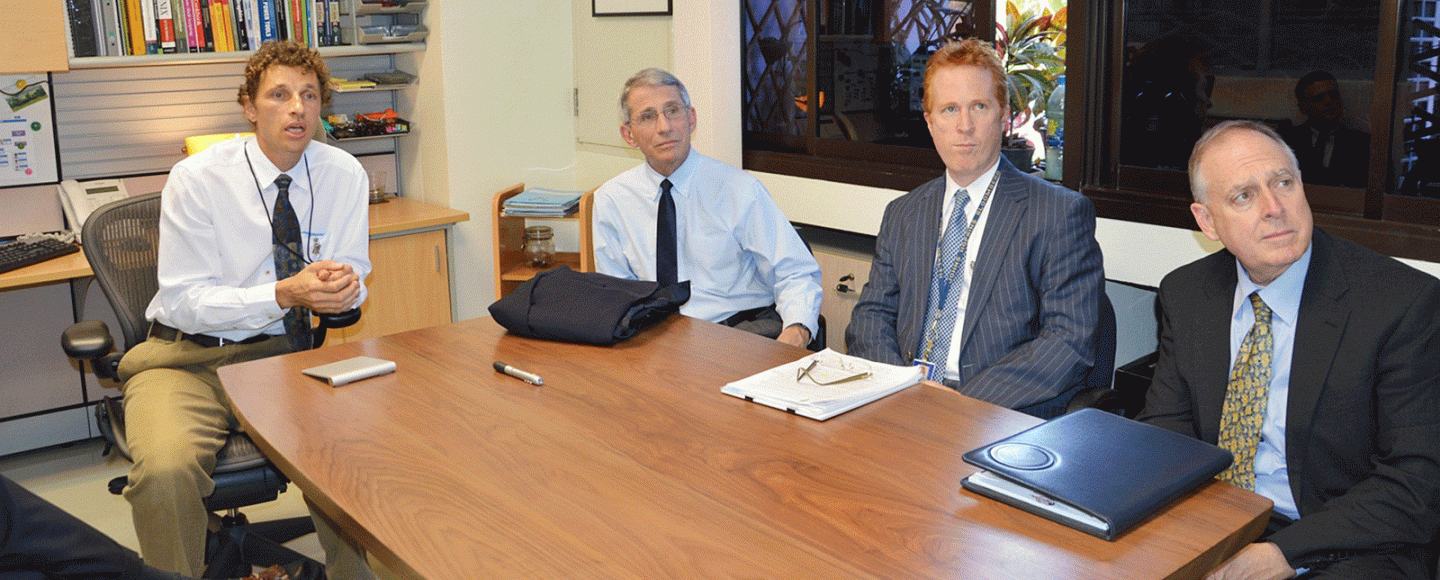Table of ContentsClose

Like many aspiring doctors, Timothy Holtz (91MD) entered medical school determined to become a surgeon, to skillfully wield a scalpel to save lives.
By the time he earned an MD from the University of Iowa Carver College of Medicine, however, Holtz began considering a career with more global influence.
The Big Picture
In 2014, Timothy Holtz, MD, MPH, (second from right) hosted Anthony Fauci, director of the National Institute of Allergy and Infectious Diseases, at an HIV prevention clinic in Bangkok.
"It was at Iowa that I started learning about public health," says Holtz. "After taking a required course on preventive medicine from Dr. Bob Wallace, a global leader in preventive medicine, I became interested in having an impact at the societal level rather than on a one-by-one basis in the operating room. I joined a study group led by Dr. Paul Greenough with fellow students who were interested in global health, and I learned about careers with the U.S. Public Health Service and the Centers for Disease Control and Prevention (CDC). A seed was firmly planted."
in research funding across the NIH's 27 institutes and centers
Now, as deputy director of the Office of AIDS Research at the National Institutes of Health (NIH), Holtz helps set the nation's priorities regarding HIV/AIDS research and prevention and coordinates the allocation of $3 billion in research funding across the NIH's 27 institutes and centers.
"My job is to make decisions on research funding priorities that will lead to new tools in the fight against HIV/AIDS," says Holtz. "That requires taking a 30,000-foot view and asking, 'What research areas should we be investing in three to five years from now?' We are always looking at what the next step needs to be."
Although Holtz sees signs of hope in the fight against AIDS, he says the HIV pandemic is not yet under control.
"Advances in prevention, particularly discoveries in the effectiveness of pre-exposure prophylaxis, or PrEP, have given hope to many at-risk populations around the world," says Holtz, citing CDC data indicating that HIV infection continues to grow among certain high-risk populations in the United States and abroad. "More prevention advances are on the way, as well as advances in treatment, but we are likely more than five years away from a functional cure or a vaccine."
Preparing Holtz for this work were two decades of spearheading global HIV and tuberculosis prevention and control programs for the CDC, most recently in India and Thailand.
“I believe health care is a human right,” says Holtz. “I am inspired by everyone in the health care field working hard to address and achieve social justice by helping people access health care services.”
After growing up in Ames, Iowa, and attending St. Olaf College of Minnesota, Holtz yearned to leave the Midwest for medical school. The UI proved difficult to pass up, however, and it ultimately prepared him for a medical career that has taken him around the world.
"The UI was cost effective and close to home, and I had access to a high-quality education and nationally known mentors. I have no regrets," says Holtz, who was recognized with a distinguished alumni award by the Carver College of Medicine in 2010. "Plus, Iowa offered opportunity and flexibility. In fact, they let me take a year off to get a master's degree in public health from Johns Hopkins University, and halfway through my fourth year, when I had completed my med school clinical requirements, I was able to study abroad in Pakistan and Nepal for several public health electives. I think it's wonderful that Iowa now has a public health school."
